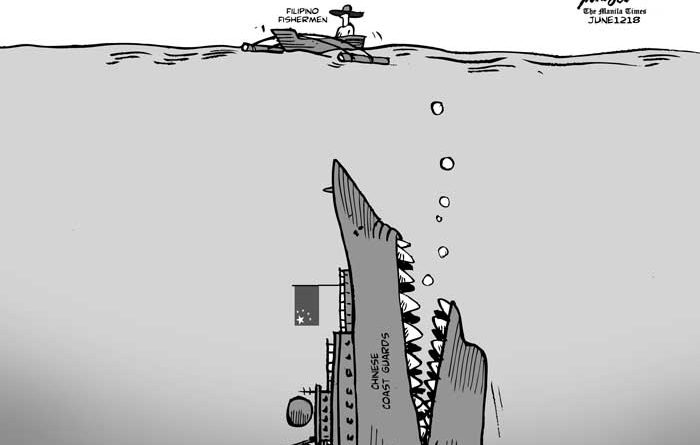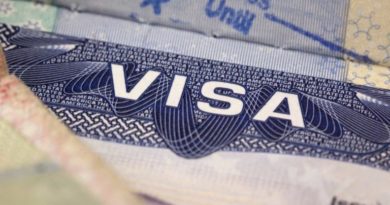OP-ED COLUMN: OPINION ON PAGE ONE – Isn’t a Chinese military invasion a redundancy?
FRANCISCO S. TATAD

TWO major Senate committees—those on foreign relations and on national defense and security—have decided to inquire into President Rodrigo Duterte’s policy on the People’s Republic of China. This is long overdue. It is necessary for the nation to see not only what DU30 is doing and wants to do on China, but also what China is doing and intends to do in the Philippines and to the Philippines. Former National Security Adviser and Defense Secretary Norberto B. Gonzales has suggested in a recent online article that China could ultimately invade the Philippines. I spoke with Gonzales about this on my weekly GNN Destiny cable TV program (“Una sa Lahat”) yesterday evening, but did not have enough time for all my questions.
In his article, the former national security adviser says that while China does not have a history of invading other countries, it is not averse to using its military might to settle territorial disputes. He offers no details. There are tensions between China and Japan over the Senkaku/Diaoyu islands, between China and Vietnam over the Paracels, between China and India over their border, the McMahon Line, and there have been hostile incidents between the parties in these areas. But in fairness to China, it has not attempted to resolve these disputes by means of force.
A Chinese invasion?
Still, Gonzales suggests a violent confrontation could occur between China and the Philippines in the Spratlys where China has occupied, fortified and installed cruise missiles on islands, islets, reefs and shoals recognized by the United Nations Convention on the Law of the Sea (UNCLOS) to lie within the Philippines’ exclusive economic zone. He suggests that China could invade in order to permanently occupy these disputed areas.
And he believes that should China invade, Chinese bombers and missiles could easily destroy military and non-military targets before the UN Security Council or the United States, the Philippines’ mutual defense treaty ally, could respond to the aggression. Nonsense, says a spokesman of the Chinese government. Because of China’s exceptionally strong relationship with the Duterte government, such theory is absurd and unthinkable, he suggests.
Gonzales on the other hand insists it is not the least unthinkable. To him, China could use its military bases in the Spratlys as the beachhead of its invasion of the nation’s heartland. This theory is obviously shared by some defense and security analysts and professionals, and even by plain, ordinary citizens. It would be useful to examine this theory in a joint Senate committee investigation.
A contingency plan
Whether or not there is reason to fear the possibility or imminence of a Chinese invasion, there is obvious merit in Gonzales’s call for a national contingency plan that includes the formation of a citizens’ army to improve the nation’s capability to contain an aggressor. The potential aggressor need not be Chinese; the threat could come from any source. It is always better to be prepared should adversity strike than to be totally unprepared if and when it does.
But while our attention is being drawn to a possible Chinese armed invasion that may or may not occur, we are also being shunted away from the actual invasion that is already taking place and already in its advanced stages. This is not military, but far more real than that which is yet to come. I am not convinced China will need to unleash its military might against us, in order to subjugate us or put us under its control. That would be a superfluity, given the master-client relationship that now obtains between Beijing and the Duterte administration.
The US will intervene
Under DU30, the Philippines has virtually become a Chinese province. An armed invasion would be an unnecessary act of madness that could kill so many resident and visiting Chinese nationals, and prompt the United States, the country’s mutual defense treaty ally, to intervene. There is no reason in the world for the US not to intervene.
Under the US-Philippines Mutual Defense Treaty, an armed attack on one party will be considered an armed attack on the other, which must be met with a timely and sufficient armed response. Although the treaty does not contain an “automatic retaliatory clause,” it is idle to speculate that if the Philippines were attacked, Donald Trump or whoever is sitting as US president would for one moment hesitate and wait for the US Congress to declare a state of war before pushing the necessary buttons that must be pushed. We saw this in Vietnam, Iraq, Afghanistan, Libya, and Syria, where the US president acted without the prior authorization of Congress.
Because China threatens to displace America as the dominant Asia Pacific power, the war hawks in the US would most certainly welcome a convenient excuse to strike at China before it becomes a full-fledged political and military world power. There can be no danger of a delayed US response to a Chinese version of a Pearl Harbor. China has a standing army of 2.3 million men, an air force with over 3,000 fighter jets, bombers and other planes, a navy with 492 warships, 68 submarines, 710 naval aircraft, and at least one aircraft carrier. But it is still no match to the US, the mightiest military power the world has ever seen. Thus, the war hawks will want to hit China before it achieves complete military parity with the lone superpower.
China knows the odds
The Chinese know this. They know that as of now they cannot disable the US at the first exchange of intercontinental ballistic missiles. The last high-ranking US combat general who spoke about it was not exaggerating when he said the US Marines have a very long experience in removing offensive “islands” similar to those in the Spratlys where the Chinese have installed cruise missiles. The millennia-wise Chinese will therefore avoid a nuclear showdown.
Moreover, China does not have to attack and try to overrun the Philippines to get what it wants. Without having to use force, it has already subjugated the country by political and economic means, and achieved the gains of effective “enemy occupation,” without the population being aware of it. An estimated 800,000 Chinese individuals are reported to have already landed in the country to engage in what intelligence sources suspect could well include arms and drugs smuggling, money counterfeiting and laundering, gambling operations, illegal mining, illegal real estate acquisitions, and not the least, political party work for the Chinese Communist Party to help the local communists prepare for their eventual takeover of the Philippine government.
Large tracts of land and substantial mining operations, otherwise inaccessible to foreigners, are reported to have passed on to Chinese hands through Filipino dummies, and the clandestine arming and funding of communist armed groups are said to have exponentially increased. Informed sources expect two million Chinese “tourists” to visit the country next year, and every year thereafter, prompting a former tourism high official and some Department of Foreign Affairs bigwigs to propose outsourcing the issuance of Philippine visas to a private firm in Hong Kong, which has reportedly agreed to pay off the Filipino officials $20 per visa.
No need to invade Ph
Aside from not wanting to risk a thermonuclear war with the US and its allies, China will likely not want to invade the Philippines, because it already considers the country a Chinese province under a president whose first allegiance is to China and who would like to turn the country into a communist vassal state. No more definitive proof is needed than DU30’s decision to abandon the Philippines’ sovereign rights to the islands, islets, reefs and shoals in the Spratlys within its exclusive economic zone, after the Permanent Court of Arbitration at the Hague, in a ruling that was welcomed by many nations around the world, upheld those rights, and struck down China’s claim to the same areas as without any legal basis.
If that is not enough, what are we to make of DU30’s refusal to protest China’s militarization of the maritime features and installation of cruise missiles in those features in the Spratlys? And what are we to make of DU30’s gratuitous claim that China’s lifetime president Xi Jinping will not allow him to be ousted, even if he should commit such outrageous acts as to compel the Filipino people to throw him out?
Manchurian candidate?
More and more people are having no compunction in referring to DU30 as the “Manchurian candidate.” They see him increasingly as a Chinese “political project” who was programmed to succeed Gloria Macapagal Arroyo in 2010 when she ended her term on a wreckage of multi-billion economic deals with Beijing. However, the plan ran aground when former President Corazon Aquino, who had been president from 1986 to 1992, died after a short illness, and her death was used by her family to catapult Benigno Simeon Aquino 3rd to the presidency, with the help of Smartmatic, the Venezuelan election provider, which discarded all the legally required security and safety measures to win the election.
DU30’s first act was to disregard the arbitral decision at the Hague which ruled against China in favor of his own government. In October 2016, he visited China and declared he was “separating” economically and militarily from the United States and aligning himself with China and Russia “against the world.” His visit was hyped in the conscript media to make it appear he was being drowned in Chinese aid and investments, when in reality the amount of Japanese aid and investments was several times bigger than that of the Chinese.
Our Japanese experience
During the Japanese occupation, the alien occupation force established the Second Philippine Republic, a puppet government run by Filipinos. On October 14, 1943, the new Republic was proclaimed, a new Constitution was promulgated, Jose P. Laurel became president, and a pact of alliance between Japan and the Philippines took effect. Most of the Filipino officials were patriots who were forced to “collaborate” in order to save their countrymen from Japanese atrocities.
On June 15, 1944, Foreign Minister Claro M. Recto wrote Lt. Gen. Takazi Wachi, Director-General of the Japanese Military Administration, to protest against such atrocities. At the behest of the Japanese High Command, President Laurel proclaimed martial law on September 21, 1944 and declared war on the United States on September 22, 1944. But the government never took up arms against the US. On October 20, 1944, Gen. Douglas MacArthur landed in Leyte Gulf to lead the liberation of the Philippines from the Japanese imperial forces.
Now we have a government run by Filipinos whose allegiance is primarily to China, and whose president considers himself a pawn, a proxy and a puppet of Xi Jinping. Since there is no resistance to this government, it may have rendered a Chinese military occupation completely redundant and superfluous. But all injury to the nation’s sovereignty and national territory, let alone pride, honor and dignity, has been consummated. Can an alien power, taking over the State by military means, inflict upon it any more injury worse than that which has been inflicted by its own government? Can a military invasion, assuming China is foolish enough to risk it, do anything more to the Filipino people, which has not yet been done or is not yet being done to them by their own government?
This, I believe, is the question that must be absolutely clear to all Filipinos at this time.
BY FRANCISCO TATAD ON


 All photographs, news, editorials, opinions, information, data, others have been taken from the Internet ..aseanews.net |
All photographs, news, editorials, opinions, information, data, others have been taken from the Internet ..aseanews.net | 






